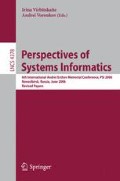Abstract
In the equivalent transformation (ET) computation model, a specification provides background knowledge in a problem domain, a program is a set of prioritized rewriting rules, and computation consists in successive reduction of problems by rule application. As long as meaning-preserving rewriting rules, called ET rules, with respect to given background knowledge are used, correct computation results are guaranteed. In this paper, a general framework for program synthesis in the ET model is described. The framework comprises two main phases: (1) equivalent transformation of specifications, and (2) generation of a program from an obtained specification. A method for program generation in the second phase, called the squeeze method, is presented. It constructs a program by accumulation of ET rules one by one on demand, with the goal of producing a correct, efficient, and non-redundant program.
Access this chapter
Tax calculation will be finalised at checkout
Purchases are for personal use only
Preview
Unable to display preview. Download preview PDF.
References
Akama, K., Shigeta, Y., Miyamoto, E.: Solving Logical Problems by Equivalent Transformation—A Theoretical Foundation. Journal of the Japanese Society for Artificial Intelligence 13, 928–935 (1998)
Akama, K., Koike, H., Mabuchi, H.: Equivalent Transformation by Safe Extension of Data Structures. In: Bjørner, D., Broy, M., Zamulin, A.V. (eds.) PSI 2001. LNCS, vol. 2244, pp. 140–148. Springer, Heidelberg (2001)
Akama, K., Nantajeewarawat, E., Koike, H.: A Class of Rewriting Rules and Reverse Transformation for Rule-Based Equivalent Transformation. Electronic Notes in Theoretical Computer Science 59(4) (2001)
Akama, K., Nantajeewarawat, E.: Formalization of the Equivalent Transformation Computation Models. Journal of Advanced Computational Intelligence and Intelligent Informatics 10, 245–259 (2006)
Akama, K., Nantajeewarawat, E., Koike, H.: Program Generation in the Equivalent Transformation Computation Model using the Squeeze Method. Technical Report, Information Initiative Center, Hokkaido University (January 2006)
Akama, K., Nantajeewarawat, E., Koike, H.: Componentwise Program Construction: Requirements and Solutions. WSEAS Transactions on Information Science and Applications 3(7), 1214–1221 (2006)
Anutariya, C., et al.: RDF Declarative Description (RDD): A Language for Metadata. Journal of Digital Information 2(2) (2001)
Bird, R.: Introduction to Functional Programming, 2nd edn. Prentice-Hall, Englewood Cliffs (1998)
De Schreye, D., et al.: Conjunctive Partial Deduction: Foundations, Control, Algorithms, and Experiments. Journal of Logic Programming 41, 231–277 (1999)
Koike, H., Akama, K., Boyd, E.: Program Synthesis by Generating Equivalent Transformation Rules. In: Proc. 2nd International Conference on Intelligent Technologies, Bangkok, Thailand, pp. 250–259 (2001)
Lloyd, J.W.: Foundations of Logic Programming, 2nd edn. Springer, Heidelberg (1987)
Lloyd, J.W., Shepherdson, J.C.: Partial Evaluation in Logic Programming. Journal of Logic Programming 11, 217–242 (1991)
Pettorossi, A., Proietti, M.: Transformation of Logic Programs: Foundations and Techniques. Journal of Logic Programming 19 & 20, 261–320 (1994)
Pettorossi, A., Proietti, M.: Rules and Strategies for Transforming Functional and Logic Programs. ACM Computing Surveys 28(2), 360–414 (1996)
Pettorossi, A., Proietti, M.: Synthesis and Transformation of Logic Programs using Unfold/fold Proofs. Journal of Logic Programming 41, 197–230 (1999)
Wuwongse, V., et al.: A Data Model for XML Databases. Journal of Intelligent Information Systems 20, 63–80 (2003)
Author information
Authors and Affiliations
Editor information
Rights and permissions
Copyright information
© 2007 Springer-Verlag Berlin Heidelberg
About this paper
Cite this paper
Akama, K., Nantajeewarawat, E., Koike, H. (2007). Program Generation in the Equivalent Transformation Computation Model Using the Squeeze Method. In: Virbitskaite, I., Voronkov, A. (eds) Perspectives of Systems Informatics. PSI 2006. Lecture Notes in Computer Science, vol 4378. Springer, Berlin, Heidelberg. https://doi.org/10.1007/978-3-540-70881-0_7
Download citation
DOI: https://doi.org/10.1007/978-3-540-70881-0_7
Publisher Name: Springer, Berlin, Heidelberg
Print ISBN: 978-3-540-70880-3
Online ISBN: 978-3-540-70881-0
eBook Packages: Computer ScienceComputer Science (R0)

